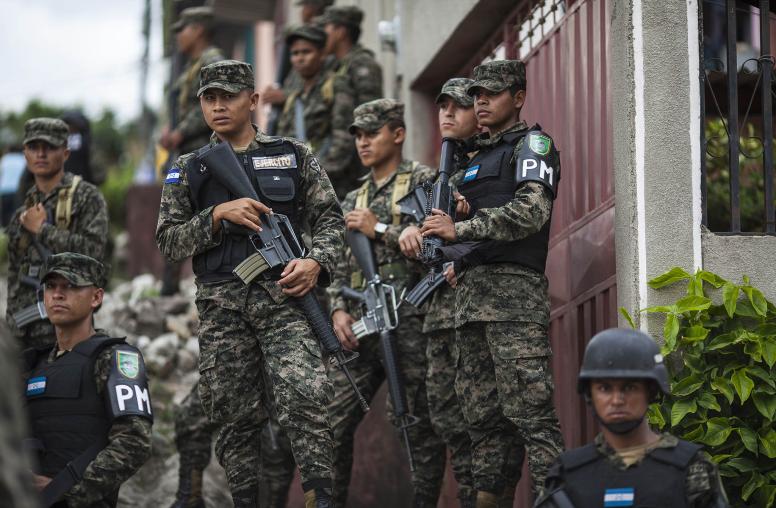Research & Analysis
U.S. Institute of Peace’s articles, reports, tools and other features provide policy analysis, research findings, and practitioner guides. These publications examine critical conflict issues at the center of the Institute’s work to prevent and resolve violent conflict.
The views expressed in these publications are those of the author(s).

Mary Speck on China’s Search for Inroads into Central America
China has ramped up its engagement in Guatemala, Honduras and El Salvador so that it can “operate in the United States’ backyard,” says USIP’s Mary Speck. However, China “likes to give showy gifts, but hasn’t really invested” in what the region needs to address governance issues, economic instability and organized crime.

La Seguridad de EE. UU. en las Américas Pasa por El Salvador, Guatemala y Honduras
Los tres países más septentrionales de Centroamérica —Guatemala, El Salvador y Honduras— se encuentran entre los más pequeños y pobres del hemisferio occidental. Aunque a menudo pasados por alto, su ubicación en el punto de conexión entre América del Norte y del Sur los hace peligrosos de ignorar. La inestabilidad política y económica en esta región estratégicamente ubicada puede repercutir en toda América.

U.S. Security in the Americas Flows Through El Salvador, Guatemala, Honduras
The three northernmost countries of Central America — Guatemala, El Salvador and Honduras — are among the smallest and poorest in the Western Hemisphere. Though often overlooked, their location at the nexus of North and South America also makes them dangerous to ignore. Political and economic turmoil in this strategically located region can reverberate throughout the Americas.

Honduras y El Salvador: Dos estados de excepción con resultados distintos
A finales de 2022, la presidenta hondureña Xiomara Castro le declaró la “guerra a la extorsión”, imponiendo un “estado de excepción” para combatir las maras y pandillas del país. El decreto de emergencia abarcó áreas de alta criminalidad en las dos ciudades más grandes del país, Tegucigalpa y San Pedro Sula, suspendiendo libertades civiles, como la libertad de movimiento y reunión, y permitiendo a la policía realizar arrestos y registrar hogares sin órdenes judiciales.

Honduras and El Salvador: Two Crackdowns on Crime with Different Outcomes
In late 2022, Honduran President Xiomara Castro declared “war on extortion,” imposing a “state of exception” to fight the country’s street gangs. The emergency decree covered high-crime areas in the country’s two largest cities, Tegucigalpa and San Pedro Sula, suspending civil liberties, such as freedom of movement and assembly, and allowing police to make arrests and search homes without judicial warrants.

From Dams to Data: China’s Shifting Interests in Central America
China continues to face economic headwinds, marked by reports this week of a protracted property slump. To address its mounting economic and financial challenges, Beijing is implementing a new industr

El Salvador’s Bukele: From ‘World’s Coolest Dictator’ to ‘Philosopher King’
El Salvador’s president, Nayib Bukele, celebrated a landslide electoral victory on Feb. 4, far outstripping his nearest competitor. “The opposition was pulverized,” Bukele told jubilant crowds outside the National Palace on election night. In reply to critics who warn that El Salvador is moving toward authoritarianism, he proclaimed, “we are not substituting democracy because El Salvador has never had democracy.” The leader who once called himself the “world’s coolest dictator” now boasts of being his country’s “philosopher king.”

A Preview of 2024 Elections Throughout Latin America
Anti-incumbent sentiment has gripped much of Latin America in recent years, swinging electoral results leftward in Mexico, Colombia, Honduras and Brazil, upending the corrupt coalitions that have long ruled Guatemala, and handing the presidency of Argentina to a self-proclaimed “anarcho-capitalist.” But 2024 may prove to be a good year for establishment politicians. In the five countries with elections on the calendar — El Salvador, Panama, Dominican Republic, Uruguay and Mexico — insider candidates are polling ahead, at least so far.

Un avance sobre las elecciones de 2024 en América Latina
En los últimos años, el sentimiento anti-oficialista se ha apoderado de la mayoría de América Latina, moviendo el péndulo electoral hacia la izquierda en México, Colombia, Honduras y Brasil, trastocando las coaliciones corruptas que durante mucho tiempo han gobernado en Guatemala y entregando la presidencia de Argentina a un autoproclamado "anarcocapitalista". Sin embargo, el 2024 podría resultar ser un buen año para los candidatos del oficialismo. En los cinco países con elecciones este año —El Salvador, Panamá, República Dominicana, Uruguay y México—, los aspirantes de los partidos gobernantes, al menos hasta ahora, encabezan las encuestas.

How Should the U.S. Respond to China’s Influence in Latin America?
On August 21, the Central American Parliament — a regional body representing Guatemala, El Salvador, Honduras, Nicaragua, the Dominican Republic and Panama — voted to expel Taiwan as a permanent observer and replace them with the People’s Republic of China (PRC).